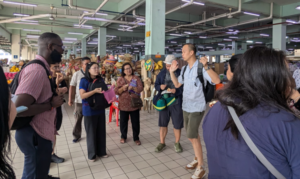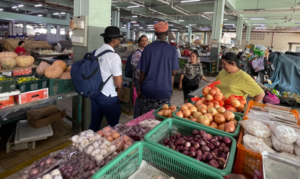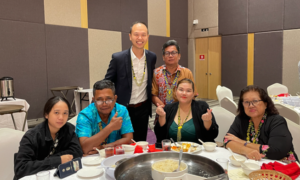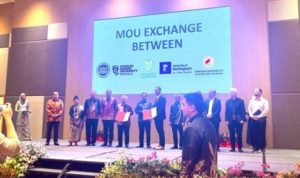Yang Bong is a fourth-year PhD Candidate at the Horizon CDT, based in the N/Lab, Nottingham University Business School. Supervised by John Harvey, Andy Crabtree and Lewis Cameron (Edinburgh), his research centres on the design implications of digital marketplace platforms for rural microenterprises in postcolonial settings, namely Sarawak, Malaysia.
Yang received a CDT Impact Activity Small Grant to support the participation of five local community members in a workshop he led at the Participatory Design Conference 2024 (PDC24) held in Malaysia.
 Research workshop at Sibu Central Market |  Local Informants leading international participants through the market ethnography session |
 Group photo with local informants at the formal dinner reception |  MoU Exchange between University of Nottingham and University of Technology Sarawak (UTS) at the PDC24 dinner reception witnessed by the Premier of Sarawak |
1. Summary
This report provides an overview of the full-day workshop held in Sibu, Malaysia on the 12th of August which was an accepted paper at the PDC24 conference. The participation of local communities, enabled by the CDT Impact Grant, has facilitated the inclusion of local communities in benefiting from the international conference, held for the first time in Asia in its three decades of history.
Through this funding support, knowledge exchange was facilitated between local and international participants, particularly on the areas of digital commerce, with a greater empowerment to local communities normally not included in such settings, and for international communities in understanding local tacit knowledge not usually accessible on scientific publications.
2. Workshop at PDC24
The theme of the Participatory Design Conference 2024 was ‘Reaching Out: Connecting Beyond Participation’, advocating for the centering of participation beyond the traditional “connoisseurs” of the discipline, including wider stakeholders such as government, marginalized communities and underserved people groups.
Five local Sarawakians from the Iban and Bidayuh tribes, two of the most significant indigenous groups in Sarawak, participated in the full-day workshop as local informants and knowledge experts. In the morning session, they led discussions on the Sibu Central Market, sharing insights on local produce and purchasing practices—key data for co-designing a digital marketplace tailored to the community’s needs. During this session, each small group—consisting of 1 to 2 local informants and 3 to 4 conference participants—collaboratively worked to elicit ideas and identify local challenges. Their goal was to produce a design that addressed these issues while meeting the needs of micro-entrepreneurs.
Titled ‘Selling Durian Online? Reimagining Digital Marketplaces that embody and empower rural businesses’, the workshop not only facilitated invaluable data collection for Yang’s PhD research, but it has also brought together a total of 19 participants, including 5 from Sarawak. Participants of the workshop came from Malaysia (East and West), India, Japan, Denmark and Namibia, and comprised of researchers, academics, social enterprise directors, as well as micro-entrepreneurs and digital platform operators. The full workshop paper is now published on the ACM Digital Library: https://dl.acm.org/doi/10.1145/3661455.3669892
3. Participation and Engagement
Aligning with the theme of ‘Reaching Out’, the CDT Small Grant has facilitated the inclusion of traditionally excluded communities of research and technological design, specifically the indigenous and rural communities of Sarawak.
In the afternoon session, participants took part in the co-design sessions, whereby in groups of 4 to 5, each group reimagined a digital marketplace that was tailored to the needs and realities of the local communities. During this session, each small group, consisting of 1 to 2 local informants, and 3 to 4 conference participants, worked collaboratively in the eliciting of ideas and local challenges, to produce a design that would both address local issues while meeting the needs of micro-entrepreneurs.
In the evening, the local participants were invited to the formal dinner reception at the UTS, funded as a compensation for their workshop participation. Their inclusion at the formal dinner reception at the university was impactful in providing them the opportunity to attend as guest in an international event held in their local town. It was also impactful for them in that the event allowed them to meet key government leaders, such as the Premier of Sarawak, Datuk Patinggi Tan Sri Abang Johari Tun Openg and the mayor of Sibu, Mr Clarence Ting.
4. Outcomes and Impact
All groups in the workshop presented their final design, showcasing their ideas that included both grounded perspectives of local communities, as well as the technical know-how of designers and academics. The quality of the participatory design outputs was significantly enhanced through the co-design efforts of both local and non-locals.
The workshop has benefited the local participants by providing them the opportunity to be included in research that impacts their lives, as well as engaging with the wider PD research community. Their perspectives and opinions were disseminated, while local challenges were shared and debated amongst various stakeholders on an international stage, for both awareness and solution-finding.
5. Challenges and Reflection
Reflecting on the workshop, one of the challenges faced on the day was the management of time and work pace of different individuals in the workshop. Distilling the multi-sensory ethnographic experience in the morning to actionable ideas within a workshop setting was also tasking. Aside from that, feedback from a participant from the post-event survey was that coffee breaks should not be cut short.
In future workshops, participants would benefit from longer periods of ideation and idea drafting time alongside more frequent breaks.
Secondly, there could also be more facilitation from the workshop organisers, in probing and encouraging discourse among participants. As most of the co-authors of the paper were not able to attend the conference, there is limited resource in facilitation, an hence the support from the organisers in each group was minimal.
With that said, the strong group rapport intentionally built through the day, has supported the openness and discussion within each group, compensating for the lack of facilitation from the workshop organisers. From the icebreakers in the morning, to travelling on the road together, experiencing the market with one another, followed by lunch. The group relationship and familiarity would have been its strongest right before the co-designing session, creating an ideal and comfortable dynamic for participatory design.
6. Financial Reporting
The £500 funding from the CDT was primarily allocated towards the workshop registration and dinner reception fees for the 5 participants, followed by the costings of the workshop which includes travel costs and workshop purchases at the market. The actual expenditure aligned closely with the projected budget and all funds have been utilised (Appendix 8.3). Alongside CDT’s financial contribution, the conference was also supported by Asia Research Institute and the International Collaboration Fund.
7. Conclusion
The support from the Horizon CDT Small Activity Impact Grant was instrumental in enabling the participation of local communities at the research workshop. Not only have the communities been exposed to an international community of researchers in mutual learning and knowledge exchange, but their positioning as experts in local knowledge in this co-design workshop has empowered them to be confident of their ideas and perspectives in influencing technology design.
8. Appendixes
8.1 Funding Expense Reporting
Total Funding Awarded: £500
Total Spent: £557.80
*Additional £57.80 covered by Horizon Centre for Doctoral Training
8.2 UKAS Sarawak (Sarawak’s Public Communication Channel) showcasing the MoU exchange

(Screenshot from official TikTok)
8.3 PDC24 Conference Programme:
https://pdc2024.org/conference-program/

8.4 Acknowledgement on Publication
Paper 1:
Selling Durian Online?: Reimagining digital marketplaces that embody and empower rural businesses https://doi.org/10.1145/3661455.3669892
